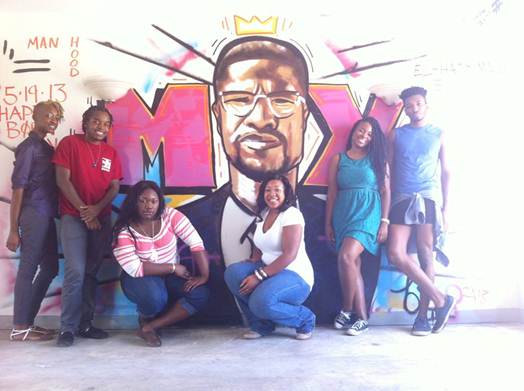For Teacher Educators
Villegas and Lucas' Educating Culturally Responsive Teachers is the pre-eminent text for teacher educators who wish to develop culturally responsive teachers. In this book, they list six dispositions of culturally responsive teaching that you could use to develop yourself, your teachers, and your staff. Just as with teachers, there is no "easy as 1-2-3" method for developing culturally responsive dispositions, but see below for actions you take with your teachers and your staff.
Stevona Rogers (MTLD, New Orleans) and the Teach 4 Liberation Network
Words From Stevie"Teach 4 Liberation is a group of educators in the Greater New Orleans - Louisiana Delta region that I have the pleasure of coaching around Culturally Responsive Teaching. T4L is devoted to answering the question of what it looks like to truly put students and families at the center of our theory of change. We see the classroom through the eyes of our students and create curricula that teach the following: self-love, solidarity, and self-determination in and beyond designated grade levels and subject areas.
As a network we educate our students in ways that help make visible the ecological, social, and community issues that will shape their lives and futures. We have made a commitment to constantly use an indigenous perspective to understand and work against educational inequity. Embodying respect and humility, we believe that in order to directly provide the type of education our students’ deserve, we must be fully engaged participants in the cultural practices of the communities in which we serve. This network is especially important in a setting like New Orleans where many education pundits’ point to this city as the model for what education reform should look like for Black and brown communities. While many institutions are proving that significant gains can be made academically, we believe there has to be a deliberate building of our student’s cultural competence and critical consciousness simultaneously. I have lost nine Black male students to gun violence and seven of them were in college. With that being said as educators we have to talk about educating children holistically. We have to talk about a curriculum that gives students critical hope. We have to push more models that teach students to transform their communities and not transport from them." What are T4L Teachers Doing?
|
As a network we are aware that in order to witness transformation change we must first liberate ourselves. Throughout the year we will:
Our hope is that together our efforts will decolonize and provide critical pedagogy in order to better provide holistic learning opportunities for dispossessed youth of color to respond to the dehumanizing conditions on their communities and the world. More About T4L
|
Developing Yourself
Tara Harrington, Director of Teacher Leadership Development in South Dakota, offers her reflections on developing her own culturally responsive perspective. Listen to her reflections about navigating the cultural difference between her and the community in which she lives, and the ways that listening to other people's realities has allowed her to develop her own perspective.
Developing Teachers
Designing Learning Experiences
|
Coaching Culturally Responsive
|
Developing Teams
Courtesy of Elizabeth Ayala Harris, Director of Design for Teach For America ([email protected])
We can draw from Villegas and Lucas’ six strands in Educating Culturally Responsive Teachers to lead teams with a culturally responsive orientation. Inclusive and welcoming teams operate free from norms and archetypes of successful leadership associated with any dominant cultural group. Instead, they empower and enable their team members as change agents by constructing their group culture and practices around the people who make up the team and the constituents with whom the team works. Culturally responsive team leadership requires the following practices:
We can draw from Villegas and Lucas’ six strands in Educating Culturally Responsive Teachers to lead teams with a culturally responsive orientation. Inclusive and welcoming teams operate free from norms and archetypes of successful leadership associated with any dominant cultural group. Instead, they empower and enable their team members as change agents by constructing their group culture and practices around the people who make up the team and the constituents with whom the team works. Culturally responsive team leadership requires the following practices:
- Develop your own and your team's sociocultural consciousness. Check out an excerpt from Andres Tapia's The Inclusion Paradox to get started.
- Deeply understand the current reality behind your team's inclusion and culture. Check out this Team Culture Diagnostic Survey to get started.
- Know the people on your team, the constituents with whom your team works, and embrace a constructivist view of knowledge, teaching and learning.
- Examine and revise team practices in response to the above:
- Operational and communication norms
- Team systems and structures for communication, collaboration, and accountability
- Leadership opportunities, career support, and partnerships for growth and collaboration
- Development opportunities and learning experiences
